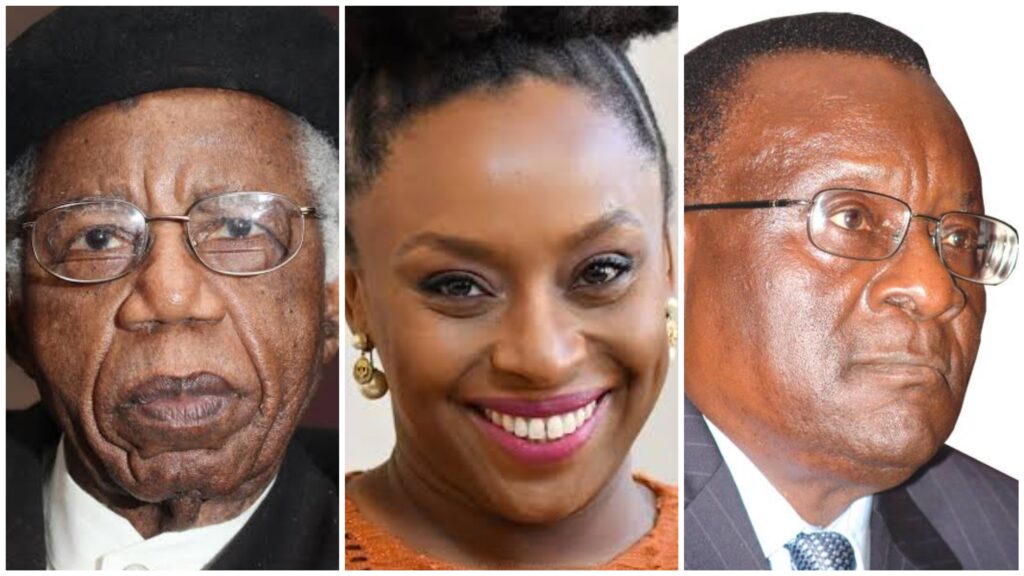Have you read about the award investiture ceremony held at the International Conference Centre, Abuja, the Federal Capital Territory where President Buhari conferred National Honours Awards on 447 recipients comprising Nigerians and non-Nigerians labelled ‘friends of Nigeria’?
National Honours are the highest honours or awards that a citizen can receive from his or her country for service to the country.
Aside the refusal of popular Nigerian singer, Teniola Apata to greet or handshake President Buhari and the ‘unusual’ appearance of Paystack co-founder, Ezra Olubi which attracted a lot of reactions from netizens, Popular Nigerian author, Chimamanda Ngozi Adichie also rejected the national honor.

The decision of Chimamanda Ngozi Adichie to decline the national honor generated conflicting reactions from netizens.
A section of netizens claimed that Adichie’s decision was a flagrant disrespect to President Buhari and Nigeria while others claimed that Adichie’s decision shows her commitment to the country and a clear proof that she understands the plights of average Nigerians.
A check by WITHIN NIGERIA revealed that the popular author, Chimamanda Ngozi Adichie is not the first Nigerian to reject the national honor. Two prominent and renowned Nigerians had also declined the national honors in the past.
Nigerian novelist, poet and arguably figure of modern literature, Late Prof. Chinua Achebe rejected the national honor twice. The proud author of Things Fall Apart who was nominated two times rejected the award in 2004 and 2011.
Foremost lawyer and activist, Late Chief Gani Fawehinmi also rejected the officer of the Order of the Federal Republic of Nigeria conferred on him in 2008.
A further check by WITHIN NIGERIA revealed that these renowned Nigerians cited similar reasons for turning down the national honor. They rejected the national honor because the country has failed to live up to its expectation mainly caused by bad leadership.
Fawehinmi while rejecting the honor in 2008 which was bestowed on him by the late President Musa Yar’adua cited many years of misrule since independence.
Gani Fawehinmi via a statement said;
“I thank the president of the Federal Republic of Nigeria, Alhaji Umam Musa Yar’Adua. I thank the federal government of Nigeria and I am very grateful to the Council of State which approved the honour of Officer of the Order of the Federal Republic (OFR) given to me by the Federal Republic of Nigeria.
“In the course of my struggles over the decades for the above ideals, I have been subjected by various governments to all traumatic travails and persecutions.”
“Today, I am seventy years and eight months old and 1 am struck down by lung cancer for which I have been receiving medical treatment outside my country because my country Nigeria has one of the poorest medical services in the world but one of the richest countries in the world in terms of oil revenue,” he had said.
“My decision to either accept or reject the national honour of the award of Officer of the Order of the Federal Republic (OFR) will depend on how far the Nigerian nation through Nigerian governments tried to achieve some listed goals.”
“In the light of the above, I cannot accept the “honour’ of Officer of the Order of the Federal Republic (OFR). Whether now or in the life beyond, how can I wake up in the morning and look at the insignia of honour bestowed on me under a government that persecutes anticorruption efforts, particularly those of Nuhu Ribadu?
“A government that covertly and overtly encourages corruption has no honour in its arsenal of power to dispense honour. Consequently, I reject the dishonour of officer of the Order of the Federal Republic (OFR) termed ‘honour’ given to me by the the Federal Government.”
Late Prof. Chinua Achebe who was nominated for the second time in 2011 while rejecting the award during Jonathan led administration said the reasons for rejecting the offer when it was first made have not been addressed let alone solved. It is inappropriate to offer it again to me”.
Late Achebe via a statement said;
“I have watched particularly the chaos in my own state of Anambra where a small clique of renegades, openly boasting its connections in high places, seems determined to turn my homeland into a bankrupt and lawless fiefdom. I am appalled by the brazenness of this clique and the silence, if not connivance, of the Presidency,” he wrote.
“Forty-three years ago, at the first anniversary of Nigeria’s independence I was given the first Nigerian National Trophy for Literature. In 1979, I received two further honours – the Nigerian National Order of Merit and the Order of the Federal Republic – and in 1999 the first National Creativity Award. I accepted all these honours fully aware that Nigeria was not perfect; but I had a strong belief that we would outgrow our shortcomings under leaders committed to uniting our diverse peoples. Nigeria’s condition today under your watch is, however, too dangerous for silence. I must register my disappointment and protest by declining to accept the high honour awarded me in the 2004 Honours List.”
However, the Nigerian author, Chimamanda Ngozi Adichie has not clearly stated why she did not accept the national honor. But the only reason why a Nigerian of such competence and grace would reject the honor is if he or she does not agree with the present awarding government or if the person receiving the award is sensing a sinister purpose behind the honor
